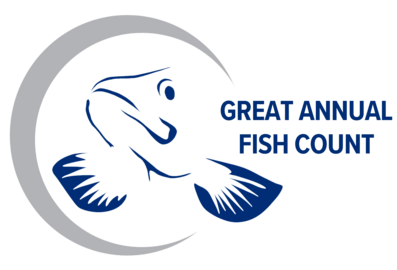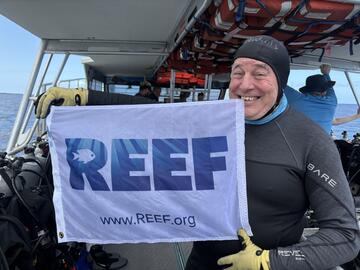This article highlights REEF's new Ocean Exploration Center in Key Largo, FL and shares information about the grand opening celebration in June 2025.
This Great Annual Fish Count, join REEF expert surveyor and marine life enthusiast, Carmen Toanchina with Biodiverse Bonaire for a FREE fish ID class on July 29 and survey snorkel the following morning! Don't miss this opportunity to learn about the beautiful fishes you can find on Bonaire, as well as how you can be a citizen scientist thorugh REEF's Volunteer Fish Survey Project.
This Great Annual Fish Count, join the Friends of Saltwater State Park for FREE marine life educational classes, followed by a group survey dive as part of the REEF Volunteer Fish Survey Project!
Times and Details:
This Great Annual Fish Count, join the Friends of Saltwater State Park for FREE marine life educational classes, followed by a group survey dive as part of the REEF Volunteer Fish Survey Project!
Times and Details:
Join the New England Aquarium Dive Club for the 22nd Northeast Great Annual Fish Count, the largest fish survey event in North America!
Survey fish to win outstanding prizes and help collect important data for marine conservation research. Following the dives, gather for a celebration where there will be a picnic, group photo, and raffle!
There are multiple dive locations. Pre-registration is required!
This is a training session for the Docent Program for the Ocean Exploration Center! The training will take 2-3 hours and include a tour of the Center, a background on the content areas and exhibits, as well as Facilitation and Interpretation practice.
Please register for the training here.
Welcome to the Citizen Science Corner, our quarterly feature to celebrate those who recently reached a milestone in our Volunteer Fish Survey Project. Here are achievements from April, May, and June 2025.
100 Survey Milestone
This is a new award for REEF members who have conducted 100+ surveys. Congratulations to those who have earned this award within the last three months!
- Harvey Suprenant
- Kevin Abbott
- Jim Minor
- Carolyn Corley
Experience Level Advancements
This Great Annual Fish Count, join the MERROW Foundation for a free marine life ID class, followed by a group survey dive as part of the REEF Volunteer Fish Survey Project!
Fish ID class: 10:00 AM at the Howard Mariculture Building at Carteret Community College in Morehead City, North Carolina
This Great Annual Fish Count, join the MERROW Foundation for a free marine life ID class, followed by a group survey dive as part of the REEF Volunteer Fish Survey Project!
Fish ID class: 10:00 AM at the Howard Mariculture Building at Carteret Community College in Morehead City, North Carolina
Join us for a FREE Fish ID Class at Trans World Radio (TWR) Bonaire Headquarters on Tuesday, June 24, starting at 7:00pm AST! Expert surveyor and REEF advocate, Carmen Toanchina, will teach how to identify and distinguish members of the Damselfish and Chromis families found in Bonaire.




